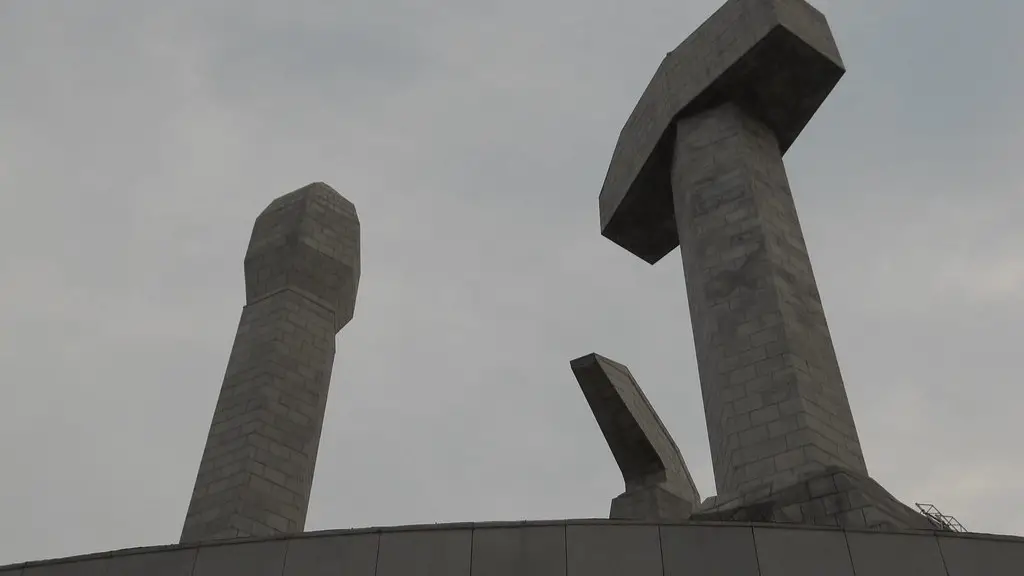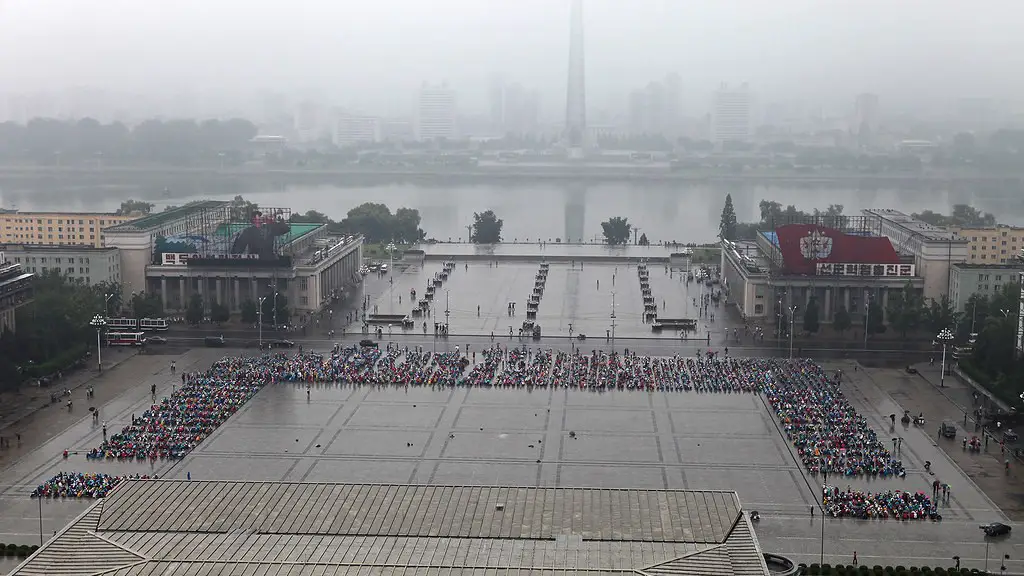With the recent increase in tensions between the United States and North Korea, many people are wondering if the US will launch an attack against the isolated country. While it is impossible to know what the future holds, it seems unlikely that the US would take such a drastic step without first exhausting all other options.
There is no one definitive answer to this question. The United States has not traditionally been an aggressor nation, but it has also not been shy about using military force when it feels it is necessary. In the case of North Korea, the decision to attack would likely be based on a number of factors, including the perceived threat posed by the North Korean government and the capabilities of the North Korean military.
Can North Korea hit the US?
The Hwasong-14 ballistic missile is a North Korean missile that can travel up to 4,500km, putting the US island of Guam in the Pacific within range. North Korea has also been testing the Hwasong-14 ballistic missile with a range of 8,000km – although some studies suggest it could travel as far as 10,000km, making it capable of reaching New York.
The United States and North Korea have a long and complicated history. The two countries have been in constant conflict since the 1950s, when North Korea invaded South Korea in an attempt to reunify the peninsula. The United States intervened on behalf of South Korea, and the two countries have been in a state of war ever since.
Despite the hostile relationship, there have been a few moments of cooperation between the two countries. In 1994, North Korea and the United States signed a nuclear agreement that halted North Korea’s nuclear program in exchange for economic assistance. The agreement collapsed in 2002, and North Korea resumed its nuclear program. In 2018, North Korea and the United States held a summit in Singapore, during which North Korean leader Kim Jong-un committed to denuclearizing the Korean peninsula. However, little progress has been made on that front, and relations between the two countries remain tense.
Is North Korea a nuclear threat
North Korea has been testing missiles and nuclear weapons for years now, and they show no signs of stopping. Their most recent tests have been particularly alarming, and it is believed that they are preparing to conduct their seventh nuclear test. This is a very serious situation, and the international community needs to take action to prevent North Korea from becoming a nuclear power.
The Department of State has issued a travel advisory for North Korea, urging Americans not to travel to the country due to the serious risk of arrest and long-term detention. The advisory also urges Americans to exercise increased caution due to the critical threat of wrongful detention.
Where would a nuclear bomb hit in the US?
The six most likely target cities in the US are as follows: New York, Chicago, Houston, Los Angeles, San Francisco, and Washington, DC. These countries will stay prepared to combat any type of nuclear attack shortly. The nuclear impact could destroy the city and this will lead to a disaster.
This is a serious concern, as it means that the US would have very little time to respond to a nuclear attack from Russia. This highlights the importance of having a strong nuclear deterrent, as it would give the US time to respond to an attack and hopefully deter Russia from launching one in the first place.
Who is North Korea’s biggest ally?
The treaty was originally signed in 1961, and was last renewed in 1981. It has been suggested that the treaty is no longer in effect, as it appears to have lapsed in 2001, but neither country has officially announced its termination.
The treaty obliges each country to assist the other if it is attacked by a third party, and has been invoked by North Korea on occasion, most notably during the Korean War.
China has provided economic, military, and political support to North Korea, but has also been critical of its nuclear weapons program. In recent years, tensions have arisen in the relationship, and China has been working to improve relations with South Korea.
Since the 1950s, North Korea’s primary international activity has been the struggle for the unification of Korea, which it has pursued primarily through diplomatic initiatives and special operations. North Korea has also used its diplomatic and military relations with other countries as a way to secure economic assistance.
North Korea’s relations with the international community have been mostly negative since the country’s founding in 1948. The country is currently isolated from most of the world, as it is one of only a few countries that does not maintain diplomatic relations with any other nation. North Korea has been labeled a “rogue state” and a “pariah state” by many in the international community due to its continued development of nuclear weapons and its large-scale human rights violations.
Which Korea is a US ally
The U.S.-South Korea alliance is a key pillar of stability in the Indo-Pacific region. For nearly seven decades, this alliance has been an anchor of peace and security on the Korean Peninsula and across the broader Indo-Pacific. South Korea is now the 10th largest economy in the world and a world-class military that has fought alongside the United States in Vietnam and Afghanistan.
General Lloyd Austin, the nominee for U.S. Secretary of Defense, reaffirmed the importance of the alliance during his confirmation hearing. “For nearly seven decades, this alliance has been an anchor of peace and security on the Korean Peninsula and across the broader Indo-Pacific,” Austin said. “I am committed to strengthening this alliance so that it remains a cornerstone of our security in the region.”
The U.S.-South Korea alliance is built on a shared commitment to democracy, human rights, and the rule of law. These shared values have underpinned our close economic, security, and cultural ties. The alliance has also served as a model for other regional relationships, including the recently launched Quadrilateral Security Dialogue between the United States, Japan, India, and Australia.
The United States remains committed to the security of the Korean Peninsula and the stability
The worry is that if the US were to remove its nuclear weapons from South Korea, it would open the door for North Korea to escalate its nuclear program and ultimately create a greater threat to the region. This could ultimately lead to the US having to reintroduce nuclear weapons into the region in order to maintain its security guarantees.
How far can a nuke travel?
The air blast from a 1 KT detonation could kill 50% of people from flying glass shards, to individuals within an approximate radius of 300 yards (275 m). This radius increases to approximately 03 miles (590 m) for a 10 KT detonation up to millions of degrees.
Russia has the most confirmed nuclear weapons, with 5,997 nuclear warheads. The United States follows behind with 5,428 nuclear weapons, hosted in the US and 5 other nations: Turkey, Italy, Belgium, Germany and the Netherlands.
What is forbidden in North Korea
If you’re planning on visiting North Korea, it’s important to be aware of their strict laws regarding what you can bring into the country. Religious, pornographic, and political items are all illegal, and you must declare all published material and electronic devices when you arrive. It’s also illegal to knowingly or unknowingly possess items that breach North Korean law. Be sure to do your research before packing for your trip to avoid any legal troubles.
Following the death of Otto Warmbier in June 2017, the US government has banned travel to North Korea using an American passport. This ban is in place to prevent citizens from being put in danger, as Warmbier’s death showed the risks associated with travel to North Korea. American citizens may still be able to travel to North Korea if they obtain a passport from another country, but they do so at their own risk.
Do North Koreans have phones?
Although North Korea has an adequate telephone system, it is not accessible to the majority of the population. Only senior government officials are able to have phones installed, and even then they must fill out a form indicating their rank, why they want a phone, and how they will pay for it. This limits the average citizen’s ability to communicate with others, which can have a negative impact on their quality of life.
In the event of a nuclear explosion, it is important to take cover and protect yourself from the blast and ensuing debris. If you have warning, try to find shelter behind something that will offer some protection. If you are outside, lying face down on the ground will help protect you from the heat and flying debris. Once the shockwave has passed, quickly make your way inside the nearest building.
What cities would be nuked First USA
Emergency response to a radioactive disaster is critical, but only a few cities are prepared. Redlener identified six cities that have the greatest likelihood of being attacked: New York, Chicago, Washington DC, Los Angeles, San Francisco, and Houston. Only New York, Washington DC, and Los Angeles have emergency management websites that give ways to respond to a radioactive disaster. This leaves the other three major cities unprepared for such an event.
In general, the smaller you are, the better. Possibly the most radiation-resistant organism yet discovered is Deinococcus radiodurans, which is famous for its ability to quickly repair damage due to radiation. These hardy microbes can easily take 1,000 times the radiation dose that would kill a human.
Conclusion
The United States has not announced any plans to attack North Korea.
The United States has not attacked North Korea and is not likely to do so in the future. Although the two countries are enemies, they are not direct threats to each other.





